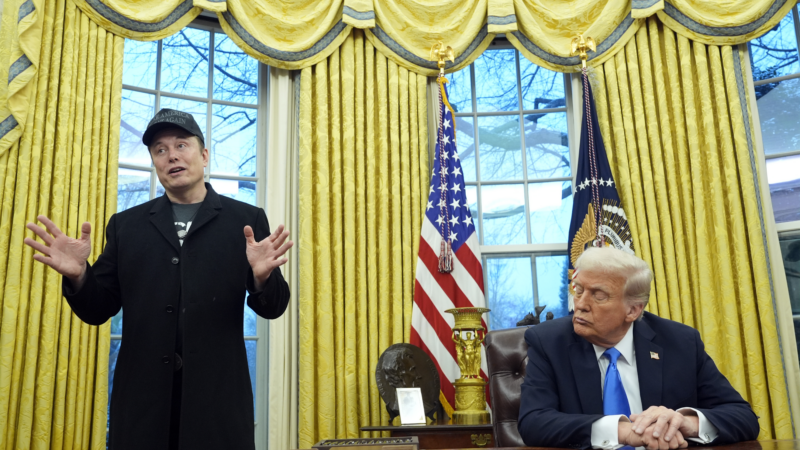Government Accountability official says fraud does exist, but it’s not widespread
President Trump and Elon Musk have vowed to uncover and eliminate fraud in the federal government, and the White House has pointed to a recent Government Accountability Office (GAO) report as evidence and justification for their ongoing efforts to take over and dismantle federal agencies.
The GAO is an agency under Congress that provides lawmakers and executive agencies with information about how efficiently and effectively components of the federal government are conducting their work.
So far, the Trump administration has not shown clear evidence of fraud.
Instead, the DOGE X account and White House Press Secretary Karoline Leavitt have pointed to the elimination of DEI — diversity, equity and inclusion — contacts and other expenditures that don’t align with the administration’s political priorities.
In a memo Wednesday, the administration said that “Trump is determined to be a good steward of taxpayer dollars and put an end to fraudulent and wasteful spending” and attached the GAO’s report.
A co-author of that report, GAO Director Rebecca Shea, tells NPR that while government fraud and waste makes up an estimated 3% and 7% of federal spending, the overwhelming majority of federal spending isn’t fraudulent.
Shea also noted that the report defines fraud narrowly — and that definition doesn’t match up with Trump and Musk’s definition. “To call something fraud, you need to prove it in a criminal or civil case,” she said.
Shea added that finding fraud takes a long time and adjudicating it takes even longer — which fraudsters take advantage of. In her GAO report, Shea suggested Artificial Intelligence (AI) could help the government catch the fraud.
“It can evolve a lot more quickly than a human might looking at the data themselves,” Shea said. “AI does offer promise when we’re able to use the data systems. There are a fair number of actual structured data sets that I think could be more readily used for fraud detection with AI capabilities, predictive modeling.”
Musk’s DOGE is reportedly working on a custom AI chatbot called “GSAi” in their effort to cut spending, according to the magazine WIRED.
But Shea cautioned that government use of AI does create its own risks.
“The flip side of that is fraudsters are using AI already to defraud federal programs,” Shea said. “And they are not hampered by the same guidelines and laws that the U.S. government is when it comes to AI. Fraudsters aren’t hindered in the same way.”
People from “all walks of life” commit fraud, even those inside the government, Shea said.
“Like anywhere there are going to be insider threats,” Shea said. “There were some government officials that were in the mix. Civil servants, contractors were also among those who were charged by the Department of Justice.”
While defending DOGE and its efforts, Musk has called the United States a “bureaucracy” rather than a democracy.
“A second American revolution is needed to free the people from their oppression by the bureaucracy!” Musk posted.
“We are happy that people are using our report, finding our information useful in the debate to try and improve federal service,” Shea said. “We have a duty of care to the taxpayer and we can do better. And we’re hopeful that our report helps us move in that right direction.”
When asked directly about Musk and the Department of Government Efficiency (DOGE) unit, Shea didn’t comment.
“I will abstain from providing an opinion on that,” Shea said. “That’s outside of my wheelhouse.”
Shea said she hasn’t personally been contacted by or worked with Musk or DOGE, though she confirmed U.S. Comptroller General Gene Dodaro, who has overseen GAO since 2008, has made contact with the Trump administration following the inauguration — as is customary.
Overall, Shea said the government is a good steward of tax payer dollars and is hopeful it will improve.
“[Annual fraud] represents between 3% to 7% of annual federal budgets in that time period,” Shea said. “Yes, it’s a big number, but the vast majority of spending is not fraudulent.”
‘We all want to be Superman; Superman wants to be us,’ says James Gunn
Morning Edition host A Martínez asks writer/director James Gunn, the man behind the reimagining of the entire DC Comics universe for the screen, about his vision for Superman.
South Korean court approves new arrest of former President Yoon Suk Yeol
A South Korean court approved the new arrest of former President Yoon on charges related to his imposition of martial law in December. Yoon's lawyers had described the arrest request as excessive.
31 workers reach safety after partial collapse of Los Angeles industrial tunnel
Construction workers inside a huge industrial tunnel in Los Angeles made it to safety after a portion of it collapsed Wednesday evening, an outcome officials called a blessing.
U.S. issues sanctions against United Nations investigator probing abuses in Gaza
The State Department's decision to impose sanctions on Francesca Albanese, the U.N. special rapporteur for the West Bank and Gaza, follows an unsuccessful campaign to force her removal.
New data reveals FEMA missed major flood risks at Camp Mystic
The data also highlights critical risks in other areas along the Guadalupe River in Kerr County, revealing more than twice as many Americans live in flood prone areas than FEMA's maps show.
Trump sets 50% tariff rate for Brazil, blasting treatment of former far-right president
President Trump defended former Brazilian President Jair Bolsonaro, who is accused of plotting an attempted coup following his loss in the 2022 election.








